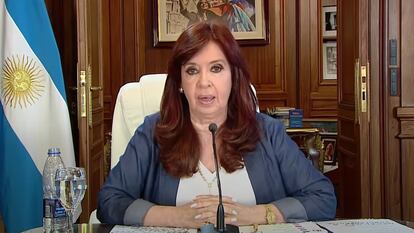Cristina Fernández de Kirchner redraws political map of Argentina after being handed six-year jail term for corruption
The former president and serving vice president announced she will not be running in the 2023 elections, sparking a Peronist succession contest and handing the centrist opposition a boost


On Tuesday, her eyes damp with emotion, Cristina Fernández de Kirchner vehemently rejected the six-year prison sentence she has been handed for corruption. It was then that that former Argentinean president and serving vice president dropped a political bombshell: “In 2023, I am not going to be a candidate for anything, for president or for senator,” she said. In case the surprise announcement had left any viewers in momentary shock, Fernández de Kirchner reiterated: “My name will not be on any ballot. I finish on December 10 [2023] and will I go back to my home, as I went back on December 10, 2015 [when her second presidential term ended].” Fernández de Kirchner, who is both the most-adored and most-despised politician in Argentina, has effectively ruled herself out of the presidential elections due to take place next October.
The unexpected announcement blindsided the Peronist political faction in the country. While the so-called Vialidad corruption case was working its way through the courts, and evidence of the embezzlement of $1 billion from the state’s coffers emerged, the clamor for Fernández de Kirchner to run for president again grew steadily. The popularity rating of the current president, Alberto Fernández, is rock bottom. And the candidacy of Economy Minister Sergio Massa rests precariously on the course of the financial crisis and successfully tackling rampant inflation, which stands at almost 100%. If Fernández de Kirchner keeps her promise – assuming it was not made in the emotion of the moment – a lengthy battle for succession will ensue. Massa, who has never attempted to hide his presidential ambition, will throw his hat into the ring with two Peronist heavyweights: Minister of the Interior Eduardo de Pedro and Governor of Buenos Aires Axel Kicillof, both of whom are members of Fernández de Kirchner’s inner circle.
Why has Fernández de Kirchner withdrawn from the race? The sentence is not definitive, and she is not legally prevented from running as a candidate. It is possible that she has simply decided to double down on the bet. The vice president remains convinced that she is facing a political witch hunt and that her opponents want to see her banned from holding office. In this, she aligned herself with Juan Domingo Perón, who was politically sidelined between 1955 and 1973 by the orchestrators of the military coup. Now, Fernández de Kirchner says it is not uniformed officers who decide who can or cannot run for office, but what she terms the “judicial party.” On Tuesday, she went a step further and spoke of a “parallel state and judicial mafia.” Behind it, she implied, are the federal magistrates who investigate corruption cases, the political opposition linked to former president Mauricio Macri and the country’s main media outlets. “They want me dead or in jail,” she said, having previously described the court as a “firing squad.” On September 1, Fernández de Kirchner survived an assassination attempt outside her home in Buenos Aires when the assailant’s firearm jammed.
After the failed attempt on her life, the clamor grew again. Those same sympathizers who chanted her name in the streets and promised riots if “anyone touches Cristina” will now have to adapt to a new political reality. The opposition, deeply divided by internal friction, will have to do the same. If Fernández de Kirchner disappears from the political map, polarization will be reduced and there will be more options for the centrists to gain ground. Waiting in the wings in that scenario is the mayor of Buenos Aires, Horacio Rodríguez Larreta. The move would also weaken the chance of most right-wing politicians of the opposition coalition, such as Macri and his former Minister of Security Patricia Bullrich.
The judges who sentenced Fernández de Kirchner said of the grounds for the ruling that they had found evidence of “fraudulent administration to the detriment of the public administration.” According to prosecutor Diego Luciani, who headed the case against the vice president, the total amount defrauded from the state coffers during Fernández de Kirchner’s two terms as president (from 2007 to 2015) stands at $1 billion. During the trial, Luciani detected irregularities in the awarding of contracts for 51 public works on highways in the province of Santa Cruz, the Patagonian stronghold of Kirchnerism.
The beneficiary of the maneuver was Lázaro Báez, a construction magnate and family friend of the Kirchners, who was sentenced to six years on Tuesday in the Vialidad case in addition to a 12-year term he had already been handed for money laundering. However, a charge of illicit association, which was created by the state to tackle drug-trafficking cartels, was not proven against Báez or Fernández de Kirchner. Opposition politicians have spoken about a ray of light in the fight against state corruption after a ruling they consider exemplary. Now it is down to them to capitalize on that enthusiasm at the polls.
Sign up for our weekly newsletter to get more English-language news coverage from EL PAÍS USA Edition
Tu suscripción se está usando en otro dispositivo
¿Quieres añadir otro usuario a tu suscripción?
Si continúas leyendo en este dispositivo, no se podrá leer en el otro.
FlechaTu suscripción se está usando en otro dispositivo y solo puedes acceder a EL PAÍS desde un dispositivo a la vez.
Si quieres compartir tu cuenta, cambia tu suscripción a la modalidad Premium, así podrás añadir otro usuario. Cada uno accederá con su propia cuenta de email, lo que os permitirá personalizar vuestra experiencia en EL PAÍS.
¿Tienes una suscripción de empresa? Accede aquí para contratar más cuentas.
En el caso de no saber quién está usando tu cuenta, te recomendamos cambiar tu contraseña aquí.
Si decides continuar compartiendo tu cuenta, este mensaje se mostrará en tu dispositivo y en el de la otra persona que está usando tu cuenta de forma indefinida, afectando a tu experiencia de lectura. Puedes consultar aquí los términos y condiciones de la suscripción digital.








































